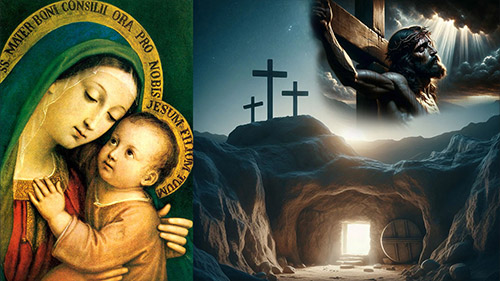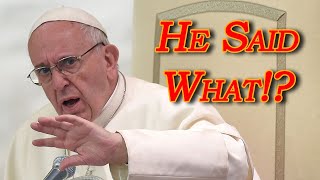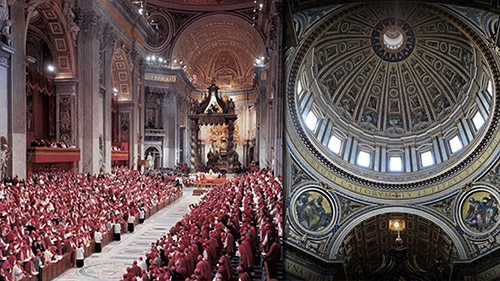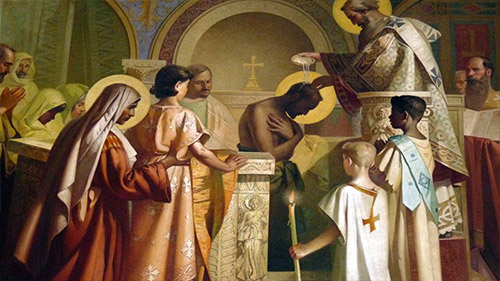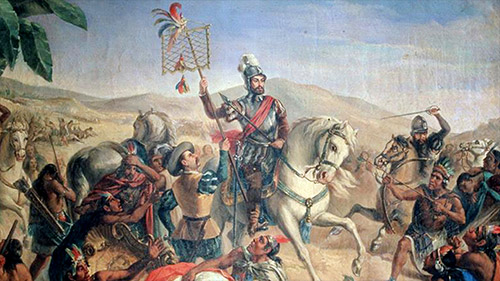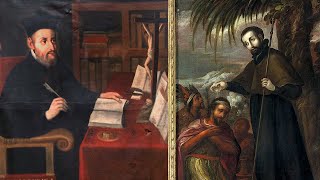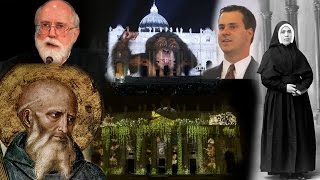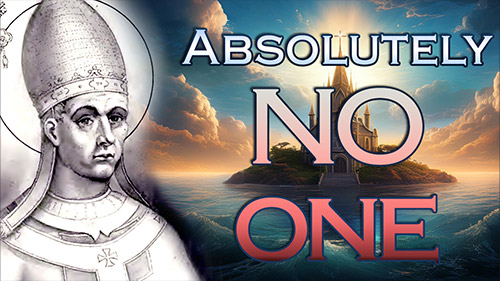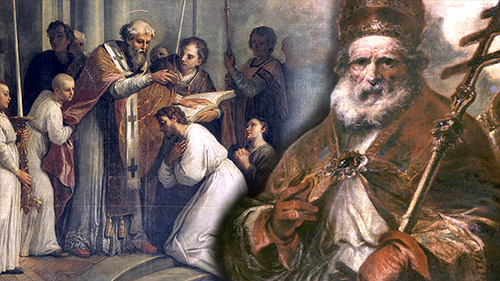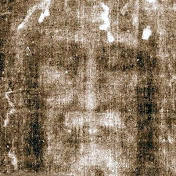 | vaticancatholic.com - English Channel |
Download Audio — File Size: 30.03 MB — Duration: 32:43 Faith & Doctrine | History | The Seven Sacraments | The True Popes Of The Catholic Church | Traditional Catholic Issues Bro. Peter Dimond Many people misuse and misunderstand statements of Pope Pius IX on the salvation issue. This video will cover the matter. First, it must be recognized that the dogma Outside The Church There Is No Salvation and the necessity of Christian/Catholic faith was defined and settled before Pope Pius IX was even born. The Church had already dogmatically declared that the Catholic faith and baptism are required for salvation. It had declared that all who die as pagans, Jews, heretics and schismatics are not saved and that there’s no other name under Heaven given to men by which they must be saved other than the name of Jesus (Acts 4:12). Concerning adults who had no opportunity to hear the Gospel, the Church teaches that they cannot be saved without the Christian/Catholic faith. Such ignorant adults are not damned for the sin of infidelity or for the sin of not having heard the Gospel, but they are damned for their other sins. St. Thomas Aquinas put it well when he stated:
This is the traditional doctrine, articulated by many saints and doctors. Most importantly, it’s proven by the teaching of the Chair of St. Peter. Pope Pius IX was one of the longest reigning popes in history. He made many strong statements on the salvation issue, such as:
Now, let’s examine the three statements from Pius IX that are most frequently referenced and misused on this issue. SINGULARI QUADAM – POPE PIUS IX TO CARDINALS, DEC. 9, 1854
Pius IX says that people who are invincibly ignorant are not held guilty in this matter in the eyes of the Lord – let me repeat that, in this matter – that is, in the matter about which they are invincibly ignorant. That’s absolutely true. As we mentioned (and cited from St. Thomas), the traditional teaching is that people who’ve never heard the Gospel, if they die ignorant of the faith, are not damned for the sin of infidelity or for a sin of not having heard the Gospel but rather for their other sins. Hence, they are not held guilty in that matter before God. But that doesn’t mean that they are not held guilty in other matters or that they can be saved without the Catholic faith. They can’t. As 16th century Dominican theologian Bishop Francisco de Vittoria stated:
Hence, Pius IX’s statement they are not held guilty in this matter before God is completely consistent with the Church’s traditional teaching that all adults who die ignorant of the essentials of the Catholic faith cannot be saved. Pius IX then affirms that God’s mercy and justice are united, and we must hold most firmly that there is one God, one faith, one baptism and that it’s unlawful to proceed further in inquiry. This contradicts the idea ‘baptism of desire’ and all who posit salvation by other baptisms (other than water baptism) or in other faiths. That’s because in the context of discussing the necessity of the Catholic faith and the issue of ignorance, Pius IX teaches that it’s unlawful to affirm anything besides the one God, the one faith, and the one baptism of divine revelation. Well, the one baptism of revelation is water baptism, as the Council of Vienne dogmatically declared. According to Pius IX, to hold anything beyond that is nefas – which means criminal or against the divine law. Let me repeat that: Pius IX teaches that it’s criminal and against the divine law to affirm anything other than the one God, the one faith, and the one baptism of Ephesians 4:5, which is the Sacrament of Baptism. He thereby implicitly denounces theories of salvation through other baptisms and in other faiths in this speech. He should have been even more explicit in denouncing those ideas, but he affirms the true position and the true rule of faith. Those who hold and teach that people can be saved without the one faith and the one baptism transgress the divine law, according to Pius IX. Pius IX goes on to say that we should pray that all nations are converted to Christ, and that “the gifts of heavenly grace are never lacking to those who sincerely wish and ask to be refreshed by this light.” This is also consistent with the traditional teaching, articulated by people such as St. Thomas and St. Bellarmine, which is that if someone is ignorant of Christ, does what is within his power, and asks God for help, God will reveal the faith to him. Notice that Pius IX associates conversion to Christ with the receiving divine light. That will become important as we proceed. QUANTO CONFICIAMUR – TO THE CARDINALS AND BISHOPS OF ITALY, AUG. 10, 1863 The next document of Pius IX that’s misused and misunderstood is Quanto Conficiamur, a letter to cardinals and bishops of Italy, dated Aug. 10, 1863. Pius IX wanted to emphasize that God’s mercy is compatible with His justice and with the truth that no one is saved without the Catholic faith. That’s why he discussed the matter of invincible ignorance on a number of occasions, as did many theologians in the past (who simultaneously correctly affirmed that no adult who dies ignorant of the Catholic faith can be saved). Hence, just because a person discusses the concept of invincible ignorance does not mean that he is teaching that such people can be saved without the Catholic faith. Pius IX states:
First, he condemns as a most grave error (“gravissimum errorem”) that men living in error and as aliens from the true faith can attain eternal life. He says that this particularly opposes Catholic doctrine. This really ends the debate, for people who are unbaptized and ignorant of the Catholic faith are aliens from Catholic unity. The Church is a unity of faith, of sacraments, etc. Pius IX therefore teaches that it’s a most grave error to believe that such people can attain eternal life while they are separated from the Church’s unity. He then discusses invincible ignorance. As we’ve noted, there is a legitimate concept of invincible or inculpable ignorance, namely, that people are not held guilty for what they do not know through no fault of their own. But such people cannot be saved without the Catholic faith. If they are responsive to God wherever they are, He will not leave them in darkness. Hence, Pius IX says that if such people diligently observe the natural law and are prepared to obey God, they are able by the operating power of divine light and grace to attain eternal. The operating power of divine light and grace refers to receiving the Gospel. For example:
Pius IX does not say that people can attain eternal life if they remain ignorant, but that they can they can attain eternal life by the operating power of divine light – which, as we’ve seen, means receiving the Gospel truth and being incorporated into Christ’s Church. We also saw the connection between receiving the divine light and conversion to Christ in Pius IX’s speech Singulari Quadam. In fact, in Quanto Conficiamur itself, just two paragraphs before the passage we are discussing, Pius IX makes a direct connection between the light and receiving the Christian faith.
According to Pius IX, the light illuminates people with the faith. It doesn’t leave them in ignorance. Pius IX also directly connects the light with receiving the Christian faith in #7 of Singulari Quidem, a document we will also discuss.
Here he directly states that the light scatters the darkness of ignorance. In fact, he uses the words divina sua luce (“by its divine light”), which include the exact same words (just in a different grammatical form) that are used in #7 of Quanto Conficiamur. In Quanto Conficiamur he used the words divinae lucis (“of divine light”). According to Pius IX, the operation of “divine light” removes ignorance. It doesn't leave people in it. Hence, Pius IX’s statement in #7 of Quanto Conficiamur, that people who are invincibly ignorant can be saved by the operating power of divine light and grace, should be understood in accord with his other statements: that such people can be saved through a providential bestowal of the light of the Christian faith upon those who are responsive to God where they are. Pius IX should and could have been more clear in Quanto Confiamur #7, but his words, properly understood, do not necessitate any false, heretical or novel meaning. If divine light is operating (if it is working), as he says, that means that a person is receiving the light and is not left in the darkness of ignorance. In fact, Fr. Michael Muller was a priest who lived at the time of Pope Pius IX. He wrote against people who misused and misinterpreted Pope Pius IX’s words to teach the heretical idea that people can be saved who remain ignorant of the Christian/Catholic faith.
The fact that God will bring such a person to the knowledge of the Christian faith is the Church’s teaching, as we’ve seen. Speaking of those to whom the Gospel had not been preached, St. Robert Bellarmine taught that they could not be saved without the Christian faith. He said that since they can know that God exists, if they pray and give alms, God will easily communicate to them the truths of the Christian faith, either through men or angels.
We covered this in our video on St. Robert Bellarmine. In 1847 Pius IX also pushed back against people who attributed to him the heretical position that people can be saved without the Catholic faith.
Pius IX thus corrected those who falsely stated that he believed in such heresies. In that speech he also affirmed that those who believe and are baptized will be saved. So, although Quanto Conficiamur was more ambiguous and misinterpretations of it have done much damage to souls, evangelism and the Catholic faith, it bears an orthodox meaning. There’s no reason to believe that Pius IX was contradicting Catholic dogma, himself, and all the saints and doctors who unanimously taught that adults must know Jesus Christ and the basics of the Christian/Catholic faith to be saved. Indeed, as we saw, in that very document Pius IX condemns as a most grave error the idea that people who are living in error and as aliens from Catholic unity can be saved. SINGULARI QUIDEM – TO THE CARDINALS AND BISHOPS OF AUSTRIA, MARCH 17, 1856 The next passage that’s misused from Pius IX is from Singulari Quidem, to the cardinals and bishops of the Austrian Empire, March 17, 1856. Certain heretics have made quite a fuss over this document – or rather over what they wrongly think the document says. Like so many aspects of the salvation and baptism issues, however, the erroneous use of this document is connected to a bad translation and a failure to carefully consider the words and the context. Before we cover the passage in question, note that in same document, Singulari Quidem #4, Pius IX refers to the Catholic Church and the See of Peter.
He teaches that people cannot find salvation outside the Church. He makes no exceptions to finding salvation outside the Church because none exist. But in paragraph #7 he’s discussing a different issue, namely, hope. In this paragraph, he’s not addressing finding salvation per se, but rather hope for salvation. This section is often mistranslated as follows: MISTRANSLATION
The translation is wrong. Pius IX does not say “unless he is excused”. He does not use, for example, the Latin word nisi.
Rather, he uses the preposition citra, which takes the accusative case. Citra can mean:
For example, The New College Latin Dictionary by John Traupman gives this as a definition of citra (with an example):
The Oxford Latin Dictionary also gives the following as a definition of citra:
In fact, in Pius IX’s other letter to Austria, Vix dum a Nobis, he uses the same word citra, but clearly with the meaning of “regardless of”. He states:
Here citra (used by the same pope to the same country) does not mean “unless”. It means “regardless of” or “irrespective of”. Pius IX says that they were going to carry out certain things regardless of his exhortations. Another example of citra used in a similar way is in a Latin translation of Clement’s epistle to the Corinthians, chap. 50:
Again, citra here does not mean “unless”. It means “without regard for” or “disregarding”. In these instances, the object of the preposition citra is disregarded as something that does not or should not limit the teaching or statement. So, if citra in this passage of Singulari Quidem is translated as “regardless of”, which is how he uses the same word in his other document to Austria, it would read:
This obviously bears a very different meaning from the mistranslation. As we’ve covered, Pius IX taught that those who are inculpably or invincibly ignorant are not condemned for that ignorance, and if they are responsive to God He will bring them into the faith. Hence, this passage of Singulari Quidem could have meant that the dogma outside the Catholic Church is 100% true regardless of the excuse of invincible ignorance. That is to say, the concept of invincible ignorance does not in any way limit the dogma. It’s perfectly compatible with it, because if someone is thus ignorant and responsive to God, He will (in His providence) bring that person into the fold. But one could also render citra in a weaker fashion, meaning “leaving aside”. In that case it would be translated:
I actually believe that this is the sense in which Pius IX is using citra in this passage of Singulari Quidem. But even with this ‘weaker’ rendering of citra, there is no heretical meaning. That’s because, as we mentioned, this passage is not about attaining salvation but rather about hope for salvation. This is a crucial point. Since Pius IX believed that the invincibly ignorant, if they responsive to God, will be enlightened, he could simply have intended to leave aside (citra) the issue of invincible ignorance when discussing whether anyone outside the Church can have a kind of hope for salvation. He could have been putting that to the side when mentioning the issue of hope. But that doesn’t mean that anyone can find salvation outside the Church or while remaining unenlightened and ignorant. Obviously they can’t. Hence, although the mistranslation and a failure to consider the context of the passage has caused some to conclude that Pius IX was heretically teaching that the dogma Outside The Church No One Can Attain Salvation has exceptions, better translations, a careful consideration of the context, and an understanding of how citra can be used show that there’s no need to conclude that Pius IX was heretically teaching that the dogma has exceptions. Indeed, the idea that the salvation dogma admits of an exception is heresy. Even someone such as Msgr. Joseph Clifford Fenton, who in fact was liberal on this issue, correctly stated that to say the dogma Outside The Church There Is No Salvation has exceptions is to deny it.
Thus, those who wrongly think that Pius IX was inserting an exception into the dogma are accusing him of blatant heresy; but, as we’ve seen, proper translations and a careful consideration of the context do not require any such meaning. Also, his passage is not infallible. The fallible teaching of Pius IX or any other pope must be set aside if it contradicts the Church’s dogmatic and repeated teaching on this matter. The Church’s dogmatic teaching in fact positively excludes all exceptions. It infallibly uses language such as: no one at all; every human creature; whoever; none; etc. in declaring that there is no salvation without the Catholic faith or outside the Catholic Church. Exceptions are thus expressly contrary to the dogma. Pius IX does not teach that the ignorant can be saved if they remain ignorant and unenlightened. He expressly condemns the idea that anyone can be saved without the Catholic faith or while separated from Catholic unity, and he declares it criminal to profess anything besides the one Lord, the one faith, and the one baptism of divine revelation. The fact that no adult can be saved without belief in the essential mysteries of the Christian faith was reaffirmed by Pope St. Pius X in his 1905 encyclical Acerbo Nimis. He also referenced Pope Benedict XIV.
When he refers to the mysteries of faith which must be known and believed to be saved, he’s not talking about simply believing in God and that God is a rewarder. He’s including mysteries of the Christian faith. In fact, he refers to the dogma of the Incarnation in the same paragraph. That’s because no one is saved without faith in Jesus Christ. For additional dogmatic proof that no one can be saved without the Catholic faith or faith in Jesus Christ, see this important video and article: How Is One Saved "By The Name Of Jesus Christ" (Acts 4:12)? Copyright © 2022 Most Holy Family Monastery |
Pope Pius IX Did Not Teach Salvation Outside The Church
July 4, 2022
SHOW MORE




